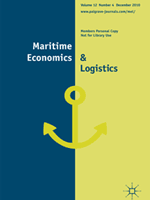
Maritime Economics & Logistics
Scope & Guideline
Navigating the Future of Maritime Economics.
Introduction
Aims and Scopes
- Maritime Operations Management:
The journal emphasizes the optimization of operations within maritime settings, including container terminal efficiency, stowage planning, and vessel scheduling. - Sustainability and Environmental Impact:
A core focus is on the environmental implications of maritime operations, including decarbonization strategies, emissions trading, and green practices in ports. - Economic Analysis of Maritime Trade:
The journal explores the economic dimensions of maritime logistics, analyzing trade dynamics, port infrastructure development, and the impacts of global economic policies. - Technological Innovations:
Research on the implementation of advanced technologies such as blockchain, artificial intelligence, and automation in maritime operations is a prominent theme. - Risk Management and Resilience:
The journal examines frameworks for managing risks in maritime logistics, including cyber threats, supply chain disruptions, and environmental challenges. - Stakeholder Engagement and Governance:
It highlights the importance of stakeholder perspectives, including local communities and regulatory frameworks, in shaping maritime operations and policies.
Trending and Emerging
- Decarbonization and Sustainability Initiatives:
There is a rising trend towards research on decarbonization strategies in shipping and port operations, reflecting global sustainability goals and regulatory pressures. - Digital Transformation and Smart Ports:
The integration of digital technologies, including IoT and big data analytics, in port operations and logistics management is becoming a key area of focus. - Impact of Global Geopolitical Changes:
Research on how geopolitical shifts, such as the Maritime Silk Road Initiative and crises like the Red Sea situation, affect maritime logistics and trade patterns is increasingly relevant. - Resilience and Risk Management Frameworks:
Emerging themes include the development of resilience strategies in the face of disruptions like the COVID-19 pandemic and climate change, indicating a proactive approach to risk management. - Stakeholder Collaboration and Community Engagement:
The importance of stakeholder perceptions and community engagement in port operations and decision-making processes is gaining prominence in recent studies. - Innovative Supply Chain Models:
Research on new supply chain configurations that leverage technology and sustainability principles is trending, reflecting the need for adaptability in logistics.
Declining or Waning
- Traditional Shipping Economics:
While foundational, traditional economic analyses of shipping markets have become less prominent as new methodologies and technologies gain traction. - Conventional Port Management Practices:
Research centered on outdated port management strategies is waning, as emphasis shifts towards innovative and sustainable practices. - General Maritime History Studies:
Historical analyses of maritime trade and shipping trends are receiving less attention compared to contemporary issues like digital transformation and environmental sustainability. - Single-Factor Analysis of Logistics:
The focus on isolated factors in logistics performance is declining, with a growing preference for holistic approaches that consider multiple variables and their interactions.
Similar Journals
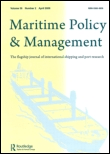
Maritime Policy & Management
Connecting Research and Practice in Maritime PolicyMaritime Policy & Management, published by Routledge Journals, Taylor & Francis Ltd, is a premier international journal that explores the complex and multifaceted aspects of maritime affairs. Since its inception in 1976, this journal has established itself as an essential resource for researchers, practitioners, and policymakers in the fields of Geography, Planning and Development, Management, Monitoring, Policy and Law, and Ocean Engineering. With an impressive impact factor evidenced by its placement in the Q1 category for multiple disciplines and high rankings in Scopus, this journal continues to contribute significantly to the academic and professional discourse surrounding maritime issues. Although it is not an open-access journal, it provides a wealth of rigorous peer-reviewed research that enhances understanding and informs best practices in the maritime sector. Positioned at the forefront of maritime studies, Maritime Policy & Management remains a vital publication for those aiming to advance knowledge and policy in this critical area of global development.

MARINERS MIRROR
Navigating the Depths of Maritime HistoryThe Mariners Mirror, published by Routledge Journals, Taylor & Francis Ltd, is an esteemed journal dedicated to exploring the rich intersections of maritime history and oceanographic research. Since its inception in 1911, this periodical has become a vital resource for scholars and professionals alike, offering a platform for high-quality peer-reviewed articles that delve into the historical significance of maritime activities, navigation, and the evolving relationship between humans and the sea. With an ISSN of 0025-3359 and an E-ISSN of 2049-680X, the journal operates under a rigorous academic framework, contributing to its current rankings in Scopus, particularly its Q3 position in History and Q4 in Oceanography as of 2023. Although it does not offer open access, it remains influential in both disciplines, fostering a deeper understanding of our maritime heritage and the environmental challenges faced by our oceans. The Mariners Mirror is essential for researchers, professionals, and students who seek to engage with the historical narratives that shape our contemporary maritime world.

Logistics-Basel
Innovating Transportation Research for Tomorrow's ChallengesLogistics-Basel, an esteemed academic journal published by MDPI, is a pivotal platform dedicated to advancing knowledge in the fields of logistics, supply chain management, and transportation. As a fully Open Access journal since 2017, it promotes the free dissemination of research findings, ensuring that crucial insights are accessible to a global audience. With its headquarters in Switzerland, the journal operates in a competitive landscape and has achieved significant recognition, evidenced by its Q2 ranking across multiple categories in the 2023 metrics, including Information Systems and Management, Management Science and Operations Research, and Transportation. The journal has been consistently contributing to its field since its inception, and its inclusion in esteemed databases like Scopus further highlights its relevance and impact. With an emphasis on fostering interdisciplinary research, Logistics-Basel serves as a vital resource for researchers, practitioners, and students alike, providing a forum for innovative studies that address contemporary challenges in logistics and operations.

Pomorstvo-Scientific Journal of Maritime Research
Unlocking Insights in Engineering and Ocean StudiesPomorstvo-Scientific Journal of Maritime Research, published by the University of Rijeka's Faculty of Maritime Studies, serves as a vital platform in the fields of maritime studies and related disciplines. With an Open Access policy established since 2006, this journal fosters the dissemination of peer-reviewed research covering a diverse range of topics within Engineering, Geography, Ocean Engineering, and Social Sciences, making it an essential resource for researchers, professionals, and students alike. As of 2023, it holds a commendable profile with Q3 rankings in multiple categories, including Engineering and Geography, highlighting its ongoing commitment to quality scholarship. Accessible from Croatia, and included in Scopus with significant rankings, the journal aims to promote innovative and practical maritime research, contributing significantly to the advancement of knowledge and policy within the maritime community.

Maritime Studies
Fostering Dialogue for a Sustainable Blue FutureMaritime Studies is a premier journal published by Springer Heidelberg, focusing on interdisciplinary research in the fields of aquatic sciences, development, geography, and environmental management. With an ISSN of 1872-7859 and an E-ISSN of 2212-9790, the journal serves as a critical platform for the dissemination of innovative studies that advance our understanding of maritime environments and their socio-economic implications. The journal boasts an impressive Q2 ranking across multiple categories, including Aquatic Science and Geography, underscoring its significance in the academic community. With a commitment to fostering dialogue on maritime policy, management, and technological advancements, Maritime Studies is essential reading for researchers, policymakers, and students dedicated to promoting sustainable practices in ocean and waterway resource management. As this journal converges between 2012 to 2024, it continues to uphold the highest academic standards, facilitating impactful research that shapes the discourse in marine studies and beyond.

Journal of Eta Maritime Science
Unlocking the potential of maritime advancements.Welcome to the Journal of Eta Maritime Science, an esteemed publication dedicated to advancing the field of maritime science and engineering. Published by GALENOS PUBL HOUSE in Turkey, this Open Access journal has been facilitating scholarly communication since 2013, ensuring that groundbreaking research is accessible to experts and enthusiasts alike. With its E-ISSN 2148-9386, the journal covers a broad spectrum of topics within maritime engineering and related disciplines. Currently positioned in the Q3 category of Engineering (miscellaneous) according to the 2023 rankings, the journal ranks #142 out of 204 in its field and is recognized within the 30th percentile on Scopus, showcasing its growing influence. Researchers, professionals, and students looking to contribute to and engage with cutting-edge maritime science will find a vibrant community and a platform for their work in this journal.

International Journal of Maritime Engineering
Bridging Theory and Practice in Maritime EngineeringThe International Journal of Maritime Engineering (ISSN: 1479-8751, E-ISSN: 1740-0716), published by UNIV BUCKINGHAM PRESS in the United Kingdom, is a vital resource for the maritime engineering community, addressing pressing issues in both Environmental Engineering and Ocean Engineering. Established in 2006, this journal serves as a platform for disseminating innovative research, technological advancements, and practical solutions that enhance the sustainability and efficiency of maritime operations. With its current classification in the Q3 quartile for both fields in 2023, it offers valuable insights to researchers, professionals, and students who seek to bridge theoretical knowledge with industry applications. Though the journal does not operate under an open access model, it remains an essential reference for academic discourse and advancement in maritime studies through its rigorous peer-review process and high-level research outputs.
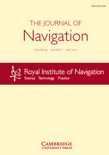
JOURNAL OF NAVIGATION
Exploring Innovations in Navigation ScienceJournal of Navigation, published by Cambridge University Press, is a premier academic journal that has served the maritime community since its inception in 1948. With an esteemed ISSN of 0373-4633 and an E-ISSN of 1469-7785, this journal is recognized for its rigorous peer-reviewed research that significantly contributes to the fields of Ocean Engineering and Oceanography. The journal ranks in the Q2 quartile, showcasing its position among the top-tier publications in these domains, with impressive Scopus rankings placing it 24th in Oceanography and 22nd in Ocean Engineering. While currently not an open-access publication, it offers valuable insights and advancements relevant to researchers, professionals, and students, fostering a deeper understanding of navigation in both theoretical and applied contexts. The Journal of Navigation aims to disseminate innovative research that impacts maritime practices and enhances navigational safety and efficiency.
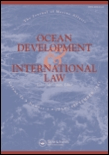
OCEAN DEVELOPMENT AND INTERNATIONAL LAW
Charting the Course for International Ocean LawOCEAN DEVELOPMENT AND INTERNATIONAL LAW, published by Taylor & Francis Inc, is an esteemed journal dedicated to the interdisciplinary study of ocean governance, environmental law, and international relations concerning marine resources. With an ISSN of 0090-8320 and an E-ISSN of 1521-0642, this journal serves as a vital platform for researchers, legal scholars, and policymakers interested in the evolving challenges of ocean development in a globalized context. The journal has established itself as a resourceful publication, evidenced by its ranking in the 2023 Scopus categories, where it is positioned in the 75th percentile for Law and the 66th percentile for Political Science and International Relations. Operating for over four decades, from 1973 until 2024, it is pivotal for advancing knowledge and fostering dialogue on critical issues such as environmental sustainability, international maritime policies, and legal frameworks governing the seas. Despite being a subscription-based journal, OCEAN DEVELOPMENT AND INTERNATIONAL LAW remains influential, offering significant insights that contribute to the development of effective legal instruments and governance strategies for oceanic resources.
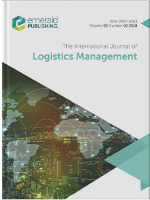
International Journal of Logistics Management
Exploring Cutting-edge Trends in LogisticsThe International Journal of Logistics Management, published by Emerald Group Publishing Ltd, stands at the forefront of research in the dynamic fields of logistics, transportation, and supply chain management. With an impressive impact factor reflected in its Q1 ranking in both Business and International Management and Transportation, this journal provides a prestigious platform for scholars and professionals to publish cutting-edge research. Since its inception in 1990, the journal has continuously evolved, reflecting the latest trends and challenges in logistics practices worldwide, with coverage extending until 2024. By facilitating access to high-quality, peer-reviewed articles, the International Journal of Logistics Management empowers researchers and practitioners alike to advance their understanding and implementation of innovative logistics strategies. This journal remains vital for those looking to make significant contributions to the field, offering a comprehensive outlet for original research, case studies, and reviews that shape the future of logistics.